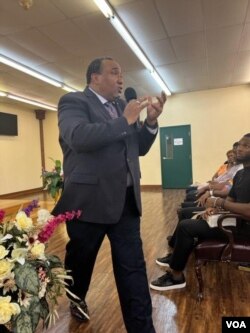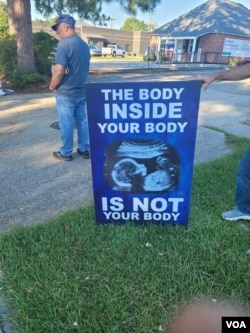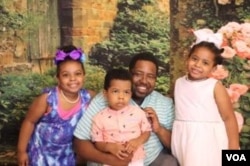Conservative Christians Rejoice After Supreme Court Rules on Abortion

[ad_1]
“I pumped my fist a bunch of times in the air and I let out a big ‘Yes!’” a beaming Alita Bryant said as she recalled her reaction Friday when she heard the momentous news she had been waiting so long to hear. The U.S. Supreme Court had overturned a constitutional right to abortion, leaving it up to states to decide whether to permit, restrict or ban the procedure that has been legal nationwide for nearly 50 years.
Bryant spoke with VOA while attending a Sunday service at Lighthouse Christian Fellowship Church in Baton Rouge, Louisiana, dressed casually in jeans and an official black and white church t-shirt.
From the outside, the place of worship looks more like a business than a typical church, having been converted from a pharmacy. Inside, however, palpable excitement coursed through the congregation of about 80 churchgoers. Nearly all, like Bryant, were African American. Many showed up early to worship before the service began.
“We’re thankful – it’s a victory for us,” Bryant said. “Innocent children won’t be murdered anymore, at least not in Louisiana. We still have work to do before it’s a national ban.”
Louisiana is one of several states with so-called trigger laws that were put in place to outlaw abortion the moment Roe vs. Wade, the landmark 1973 Supreme Court ruling that legalized the procedure, was overturned. Abortion rights proponents say banning the procedure in entire swaths of the United States will put women’s lives at risk, especially those of poor and minority women.
An NPR/PBS/Marist poll released Monday shows 56% oppose the Supreme Court ruling on abortion, with 40% supporting it and 4% unsure. Other polls have shown similar numbers.
Lighthouse Christian Fellowship Church, like many socially conservative places of worship in America, is part of a coalition that has been working to rescind abortion rights in America for decades. Many in the congregation stood, cheering in response to Pastor Mike Wicker as he alternated between reading bible verses projected onto screens and speaking at length about the evils of abortion.
“Every person in here,” the pastor’s voice boomed, echoing off ceilings lower than you’d expect in a place of worship, “thank God your momma made the right decision and didn’t bring you to the abortion clinic.”
“Now,” Bryant noted after the service, “those clinics are closed.”
A personal history
Several members of Lighthouse Christian Fellowship visited a Baton Rouge abortion clinic Monday and Tuesday of last week.
There, they saw 40 women lined up, many alone.
“And nearly all of them were Black,” Bryant added, her voice cracking with emotion. “I felt angry, because these children were needlessly going to be murdered, sad because I don’t think the mothers had all the information about their options, and desperate because I wanted to help.”
In the end, she said they convinced two women to go home and reconsider aborting their pregnancies, an option that disappeared in Louisiana after the Supreme Court decision, as the state’s three clinics ceased performing abortions. On Monday, a state judge temporarily blocked Louisiana from enforcing the trigger law, allowing clinics to resume, but the future availability of abortion services in the state remains murky.
Tara Wicker is the pastor’s wife, known also as the first lady of Lighthouse Christian Fellowship. She also visited the clinic. For Wicker, who heads Louisiana Black Advocates for Life, an anti-abortion advocacy organization, the fight against abortion is deeply personal.
“I had an abortion myself when I was 16 years old,” she told VOA after Sunday’s service. “I was just a child and we didn’t even talk about it. I was just kind of ushered off for an abortion. I’ll never forget laying in the bed with my aborted fetus in a jar on the counter across the room.”
“‘Momma’s sorry,’ I remember saying.”
Wicker said for 30 years and until only recently, she tried to suppress her emotions about that day.
“It made me insecure as a mother of the six children I have now,” she said, her eyes appearing serious and thoughtful. “When someone doubts me as a mother, I get angry and defensive because I think about how I failed that baby three decades ago.”
Abortion rights advocates contend that women will continue to seek out the procedure regardless of what a state’s law says and may be forced to consider unsafe options for terminating a pregnancy. Wicker said that needn’t be the case
“I look at the women lined up at the clinic and I remember being like them,” she said. “They don’t have to kill those babies. They have so many options. As a sanctuary we need to help them understand those options because killing that baby will haunt the mother for the rest of her life.”
Just beginning
Robert Sensley was also in attendance on Sunday. He is stout, standing 1.7 meters tall with fashionable rectangular glasses and a warm smile.
He attended the service with his three young children and his wife. In addition to being a member of the church, Sensley is also the program assistant for Louisiana Black Advocates for Life.
“The last few days have been joyful for sure,” he told VOA. “Pastor Mike and Tara were so excited about the Supreme Court decision, they both called me at the exact same time from opposite ends of their house without realizing.”
Sensley, however, stopped short of calling the atmosphere celebratory.
“We’re excited, but we also know we have a long way to go,” he said. “There are a lot of people in this country who don’t agree with us.”
In data compiled by the Pew Research Center, in cases of pregnancies caused by rape or incest, for example, 69% of Americans believe abortions should be legal.
A junior at Louisiana State University, Trinity Wicker said she hears from many friends and classmates – particularly on social media – who believe abortion rights should be protected.
“I understand where they’re coming from. Sexual assault is a horrible thing,” Wicker said. “The mother is a victim, but so is the baby; and that baby – with limitless potential – doesn’t deserve to die.”
The younger Wicker, the daughter of the pastor and his wife, said she sees it as part of the church’s responsibility to help women in difficult situations understand their options.
“Adoption is always an option, of course,” she said, before re-emphasizing that killing the fetus shouldn’t be.
“I’ve noticed a lot of women saying things like, ‘My body, my choice’ as an excuse to have an abortion. But when your egg is fertilized, it is no longer your body. It’s another body and you are the vessel.”
A sanctuary
Many members of Lighthouse Christian Fellowship do not believe abortion should be prohibited in all circumstances, such as when the life of the mother is at risk.
“Everything should be done to save both the mother and the child, but I, of course, would want my wife saved if we had to make a choice,” Sensley explained.
Louisiana’s trigger law has no exceptions for rape or incest but does allow the procedure to save a pregnant woman’s life. The law does not punish women who terminate pregnancies but establishes criminal penalties for anyone who performs an abortion.
Punishing abortion providers is as it should be, according to Tara Wicker.
“I think we have to be empathetic towards these women and try to help them,” she said, “but the medical professionals who complete the procedure should be tried for murder.”
Church leaders at Lighthouse Christian Fellowship say they wrestle with the fact that African American women disproportionally seek abortions and will be disproportionately affected by the new legal landscape governing the procedure.
A 2020 study by the Charlotte Lozier Institute found that Black women have experienced induced abortions at a rate approximately four times that of white women.
The solution, according to churchgoers, includes providing more access to employment and education to adults, as well as boosting health care and other services to help women bring their pregnancy to term and help them rear the children in their care. America does not have universal health care, nor does it guarantee access to child care for working parents.
“This is something we spend a lot of time talking about,” Sensley said, recalling words from the service he just attended. “If you only want to ban abortions without fighting to support that baby and its parents once the birth takes place, then you’re not pro-life…you’re just pro-birth.”
“It all goes hand in hand,” Tara Wicker agreed. “The role of our church is to support the whole life of the people who walk through our doors – from womb to tomb. The whole thing. We need to be supportive enough to help people do the right thing, but also forgive them when they don’t.”
[ad_2]
Source link




